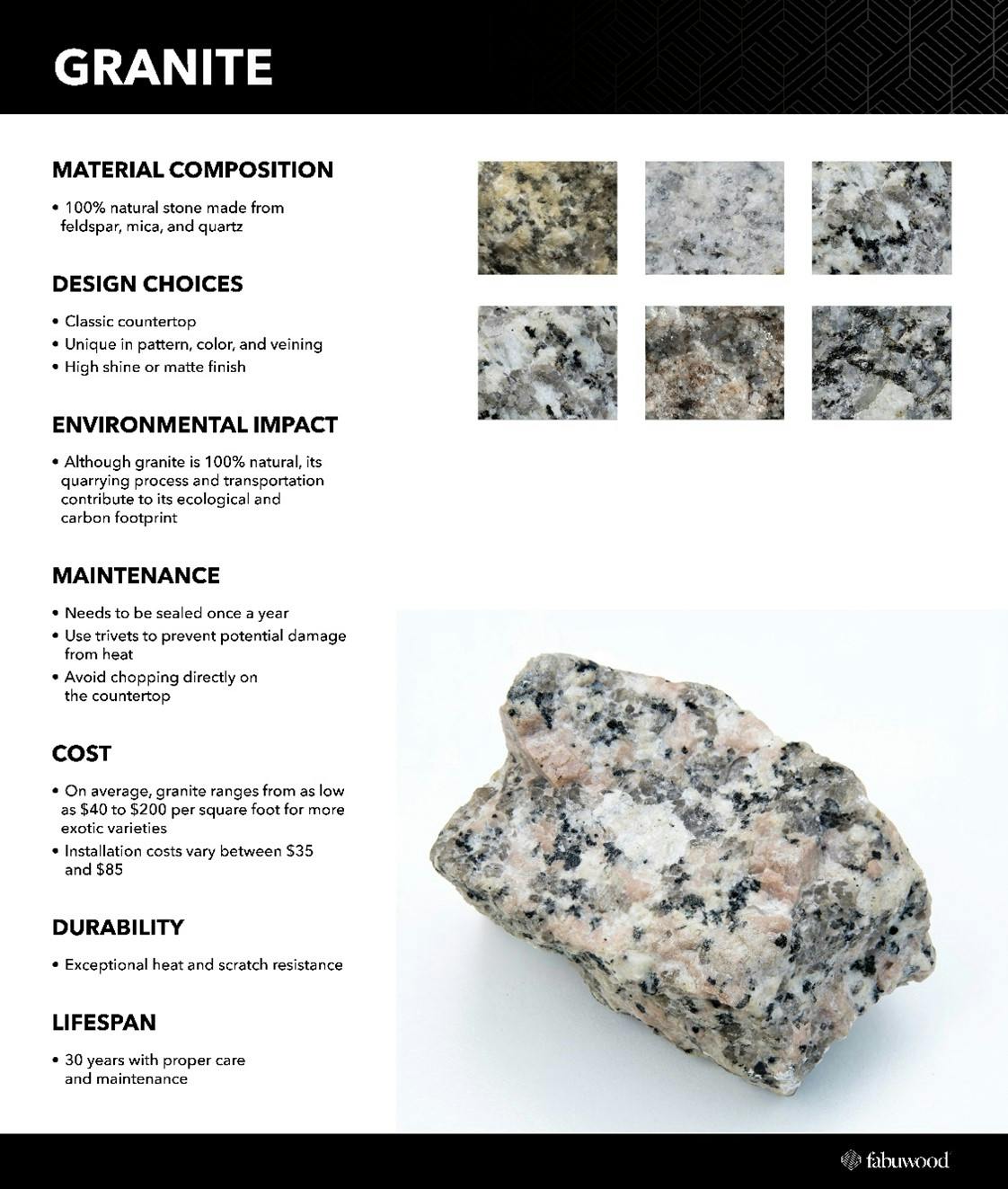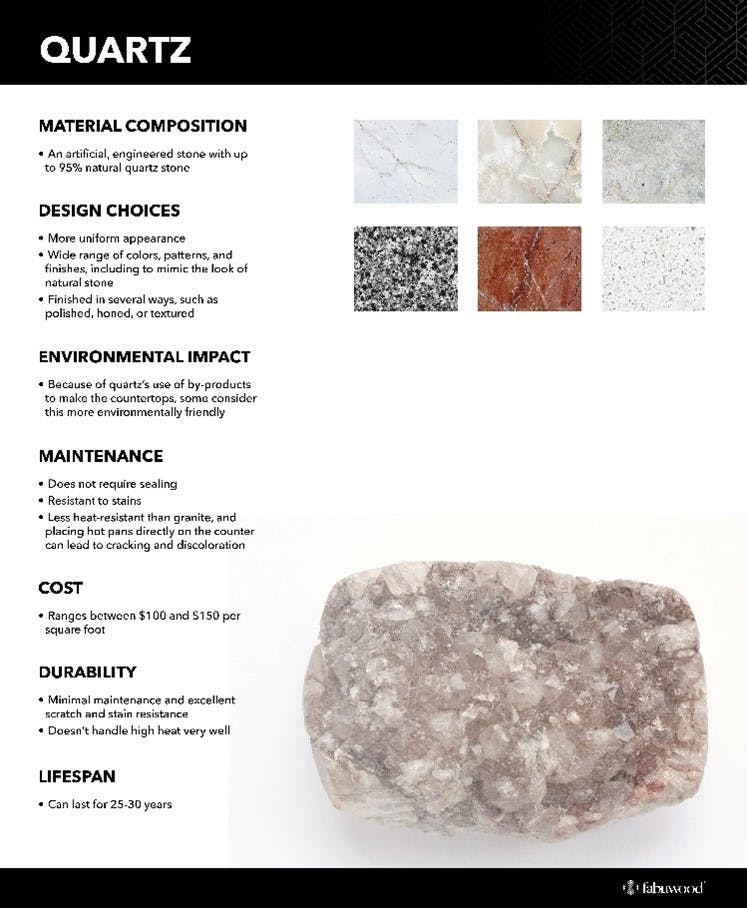
Both granite and quartz are popular kitchen countertop options. According to the NKBA’s 2024 kitchen trends report, over 75% of industry professionals believe quartz will continue growing in popularity over the next few years.
We asked our kitchen experts about the difference between the two to help you decide which is right for your home. We’ve compared granite and quartz in terms of maintenance, durability, lifespan, cost, environmental impact, and design choices.
Granite vs. Quartz: The Pros and Cons of Each
Granite Quartz

Granite vs. Quartz: Material Composition
Granite is a 100% natural stone made from feldspar, mica, and quartz. It is quarried and cut to fit your unique space. Granite is durable, heat resistant, and is available in many naturally occurring colors and patterns.
Quartz is an artificial, engineered stone with up to 95% natural quartz stone. It is mixed with other minerals and resin, which holds it together. Quartz is a low-maintenance surface that mimics surfaces like marble, and its patterns and colors are highly customizable.
Granite vs. Quartz: The Maintenance
Granite is porous, which means it can absorb liquids and potentially stain. To prevent staining, granite usually needs to be sealed once a year. It's advisable to use trivets to prevent potential damage from heat and avoid chopping directly on the countertop.
Quartz does not require sealing. The resin in the counter creates a non-porous surface resistant to stains. However, it is less heat-resistant than granite, and placing hot pans directly on the counter can lead to cracking and discoloration.
Daily cleaning of both granite and quartz involves simply wiping down the counter with warm water and mild soap.

Granite vs. Quartz: Durability
Both granite and quartz offer high durability, making them excellent choices for busy kitchens. Granite has a classic, natural look, and exceptional heat and scratch resistance. It requires more maintenance to protect against stains.
Quartz offers a more uniform appearance with minimal maintenance and excellent scratch and stain resistance. However, it doesn’t handle high heat very well and gets damaged if items placed on it are too hot.
Granite vs. Quartz: Lifespan
Granite counters can last over 30 years with proper care and maintenance, including regular sealing. The crucial aspect is routinely sealing the granite and avoiding using harsh chemicals during cleaning. On the other hand, quartz can last for 25-30 years, especially if you don’t expose it to excessive heat or direct sunlight. In comparison to granite, quartz offers a more maintenance-free lifespan.
Granite vs. Quartz: Cost
The cost of granite countertops varies widely, depending on the color, pattern, slab thickness, and installation complexity. On average, granite ranges from as low as $40 to $200 per square foot for more exotic varieties. Installation costs vary between $35 and $85.
Quartz's price is less predictable but generally ranges between $100 and $150 per square foot, including the slab, installation fees, and customizations.
Both materials enhance home value, with quartz appealing to those looking for beauty without maintenance and granite appealing to those who value natural stone’s aesthetic. When considering the cost of your countertops, consider your overall budget for your kitchen remodel to ensure you make the best decision for your kitchen and your wallet.
Granite vs. Quartz: Environmental Impact
Eco-conscious consumers consider factors like the source of the material, the distance it travels to reach them, and the sustainability of the manufacturing or quarrying practices.
The environmental impact of both granite and quartz is about the same. Although granite is 100% natural, its quarrying process and transportation contribute to its ecological and carbon footprint.
Because of quartz’s use of by-products to make the countertops, some consider this more environmentally friendly. Its maintenance is also more environmentally friendly because it doesn’t need regular sealing. If you choose a locally sourced granite or quartz countertop, this will also cut down on the environmental impact.
Both granite and quartz can be recycled and repurposed. However, the need for specialized equipment to cut granite into reusable pieces and quartz’s composite nature makes the recycling process more complex.
Granite vs. Quartz: Design Choices
People have long considered granite a classic countertop option that stands the test of time. Each slab is unique in pattern, color, and veining. From subtle earth tones to vibrant blues and greens, granite can be finished with a high shine or matte finish.
Quartz counters give you a more uniform appearance, and you can customize them to a wide range of colors, patterns, and finishes, including to mimic the look of natural stone. Quartz can be finished in several ways, such as polished, honed, or textured.
Overall, both materials create beautiful countertops that look great in any kitchen aesthetic. It comes down to your desired look and maintenance preferences.
How to Choose Between Granite and Quartz
When choosing between the two, consider your budget, specific needs, lifestyle, durability, and maintenance. If you’re looking for the unique look of natural stone and don’t mind the regular upkeep, granite is the way to go. If no maintenance is your top priority, quartz would be a better fit.
We recommend looking at more than the price tag. Consider the long-term value of both countertops and how they will each enhance your style and space. To learn more about granite, quartz, and other popular countertop options, take a moment to read our recommendations for the ten best types of kitchen countertops. Once you’re ready to design your kitchen with your chosen countertop, contact your local dealer for expert and personalized design.
FAQS
Which is more durable, granite or quartz? Granite and quartz are both highly durable and scratch-resistant. However, granite can chip or crack if you drop heavy items on it, and quartz is less heat-resistant and can be damaged at high temperatures.
Do granite and quartz need to be sealed? Only granite must be sealed regularly upon installation to prevent stains and bacterial growth. Quartz does not require sealing because the resin is built-in.
Does granite or quartz offer more design options? Granite offers unique patterns and colors; no two slabs are alike. Quartz has various colors and patterns, including designs that mimic natural stone. Since quartz is engineered, the patterns and colors are more consistent.
Which adds more resale value to your home, granite or quartz? Both materials offer distinct advantages that impact resale value, which depends on the market and potential homebuyers' specific tastes.



